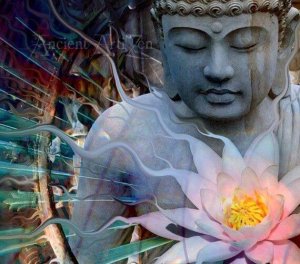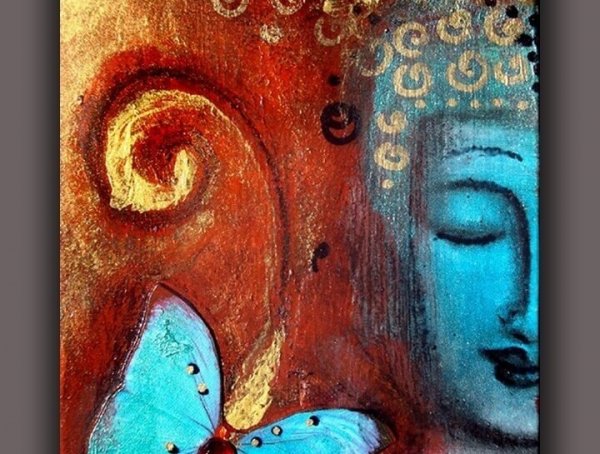The Four Noble Truths of Dharma

The teachings of Buddhism and Hinduism offer many insights into the psychology of personal growth. While you may not choose accept ideas like reincarnation or change your whole spiritual outlook, these traditions highlight our shared fears as human beings, and offer strategies to reach inner well-being.
Dharma tells us of incredibly interesting aspects of life such as the need to have a purpose in life, to act with honesty and humility, and to acknowledge our own talents as a form of internal recognition.
Dharma is the law of Buddha and his teachings transformed into purpose, into principles that should be carried out with dignity.
As humans, we are “wrapped up” in physical bodies in order to gain learning and move closer to that spiritual part of our ourselves that, in reality, is our true nature.
Today, let’s talk about the Four Noble Truths of Dharma, and attempt to reflect on these compelling principles:
The Four Noble Truths of Dharma
Dharma is always represented in the form of a wheel. This, supposedly, is the form in which Buddha imparted his laws to the world, and which later became the different schools that we have today that follow his principles and his religion.
This wheel, in turn, symbolizes that vital moment of death and rebirth, an ongoing cycle from beginning to end, a wheel through which the teachings of Buddha are dispersed, become clear, and where humanity has the opportunity to receive these principles in order to open one’s mind and advance.

1. Suffering
Within humanity is instilled a deep feeling of dissatisfaction. To be born and to die brings us suffering, remembering the past and the mistakes we have made subjects our brain to a continuous feeling of unease.
One of the most common feelings we experience is one of constant emptiness, fear and pain. Happiness is relatively scarce; and is always in our dreams but only rarely what we obtain in life.
To what do we owe this lack of satisfaction? This essential human angst? The second Truth of Dharma will clarify it for us.
2. Attachment: The Cause of Suffering
We usually establish some kind of unhealthy attachment to all that surrounds us. According to the teachings of Dharma, we as people long for and cling to material goods and even to other people, bolstering our own selfishness and vulnerabilities.
These excessive attachments generate painful passions in humanity; they become poisonous, debilitating us and making us sick. We cling to temporary things and are then hurt when we lose them.
3. Fundamental Suffering Can End
In Buddhist teaching, humans are spiritual beings with a purpose: to rise up through our wisdom, through humility and the pursuit of the truth, and to free ourselves from those material possessions while, in turn, learning from the mistakes we have made.
Until this occurs, the wheel of Dharma never stops turning. We will have infinite opportunities to correct our faults and to heal that suffering, that crucial pain. In order to liberate our spiritual selves, we must free ourselves from our material attachments and, in turn, understand that every action has an effect and a consequence.

Everything you think, everything you do, and everything you declare out loud creates an internal effect and an effect on those around you. This is because we are all part of a greater whole, and you are an equal part of that balance. You need to reach the heart of the wheel of Dharma, or your own heart, in order to be virtuous, and to bring yourself good “kharma”.
4. The Path that Brings Us to the End of Suffering
To end your suffering or dissatisfaction, you should be conscious of your own talent to do good. Understand that you are capable of healing yourself, and, in turn, you
be able to help others.
The Third Noble Truth encourages us to be conscious of ourselves and to find a purpose in this life, a “noble purpose,” something that enriches our life and the lives of others.
For that to happen, you must never fixate on the blind obsession of “possessing people or things.” It is always better to practice detachment; if you don’t, you will feel again the effects of suffering in any of its forms.
This final truth explains to us that to reach this act of internal healing, we should apply the practices of the “Eight-fold Path” to our daily lives and should include these thought-provoking principles:

1. An correct understanding of things and of oneself.
2. A correct mentality that helps us to see reality without falsehoods.
3. It is also necessary to use the right words; those that do not cause harm, and those that offer peace, balance, and love.
4. Focus your life on that cause or purpose that is truly worthwhile: to do good, to be honest, and to search for the truth.
5. Choose the right livelihood. Once you understand what your purpose in life is, put it into practice.
6. Make an effort to be good; be persistent.
7. Focus your attention.
8. Concentrate on that noble purpose. Never stray from the path.
The teachings of Buddhism and Hinduism offer many insights into the psychology of personal growth. While you may not choose accept ideas like reincarnation or change your whole spiritual outlook, these traditions highlight our shared fears as human beings, and offer strategies to reach inner well-being.
Dharma tells us of incredibly interesting aspects of life such as the need to have a purpose in life, to act with honesty and humility, and to acknowledge our own talents as a form of internal recognition.
Dharma is the law of Buddha and his teachings transformed into purpose, into principles that should be carried out with dignity.
As humans, we are “wrapped up” in physical bodies in order to gain learning and move closer to that spiritual part of our ourselves that, in reality, is our true nature.
Today, let’s talk about the Four Noble Truths of Dharma, and attempt to reflect on these compelling principles:
The Four Noble Truths of Dharma
Dharma is always represented in the form of a wheel. This, supposedly, is the form in which Buddha imparted his laws to the world, and which later became the different schools that we have today that follow his principles and his religion.
This wheel, in turn, symbolizes that vital moment of death and rebirth, an ongoing cycle from beginning to end, a wheel through which the teachings of Buddha are dispersed, become clear, and where humanity has the opportunity to receive these principles in order to open one’s mind and advance.

1. Suffering
Within humanity is instilled a deep feeling of dissatisfaction. To be born and to die brings us suffering, remembering the past and the mistakes we have made subjects our brain to a continuous feeling of unease.
One of the most common feelings we experience is one of constant emptiness, fear and pain. Happiness is relatively scarce; and is always in our dreams but only rarely what we obtain in life.
To what do we owe this lack of satisfaction? This essential human angst? The second Truth of Dharma will clarify it for us.
2. Attachment: The Cause of Suffering
We usually establish some kind of unhealthy attachment to all that surrounds us. According to the teachings of Dharma, we as people long for and cling to material goods and even to other people, bolstering our own selfishness and vulnerabilities.
These excessive attachments generate painful passions in humanity; they become poisonous, debilitating us and making us sick. We cling to temporary things and are then hurt when we lose them.
3. Fundamental Suffering Can End
In Buddhist teaching, humans are spiritual beings with a purpose: to rise up through our wisdom, through humility and the pursuit of the truth, and to free ourselves from those material possessions while, in turn, learning from the mistakes we have made.
Until this occurs, the wheel of Dharma never stops turning. We will have infinite opportunities to correct our faults and to heal that suffering, that crucial pain. In order to liberate our spiritual selves, we must free ourselves from our material attachments and, in turn, understand that every action has an effect and a consequence.

Everything you think, everything you do, and everything you declare out loud creates an internal effect and an effect on those around you. This is because we are all part of a greater whole, and you are an equal part of that balance. You need to reach the heart of the wheel of Dharma, or your own heart, in order to be virtuous, and to bring yourself good “kharma”.
4. The Path that Brings Us to the End of Suffering
To end your suffering or dissatisfaction, you should be conscious of your own talent to do good. Understand that you are capable of healing yourself, and, in turn, you
be able to help others.
The Third Noble Truth encourages us to be conscious of ourselves and to find a purpose in this life, a “noble purpose,” something that enriches our life and the lives of others.
For that to happen, you must never fixate on the blind obsession of “possessing people or things.” It is always better to practice detachment; if you don’t, you will feel again the effects of suffering in any of its forms.
This final truth explains to us that to reach this act of internal healing, we should apply the practices of the “Eight-fold Path” to our daily lives and should include these thought-provoking principles:

1. An correct understanding of things and of oneself.
2. A correct mentality that helps us to see reality without falsehoods.
3. It is also necessary to use the right words; those that do not cause harm, and those that offer peace, balance, and love.
4. Focus your life on that cause or purpose that is truly worthwhile: to do good, to be honest, and to search for the truth.
5. Choose the right livelihood. Once you understand what your purpose in life is, put it into practice.
6. Make an effort to be good; be persistent.
7. Focus your attention.
8. Concentrate on that noble purpose. Never stray from the path.
This text is provided for informational purposes only and does not replace consultation with a professional. If in doubt, consult your specialist.








